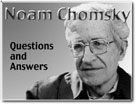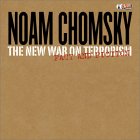Noam Chomsky agrees with the CIA that attacking Iraq puts us at risk.
Dick Gordon: Noam Chomsky, tell me how you are watching the protests now and how you measure them at this time? Noam Chomsky: Well, the most striking thing about them I think is first of all that they are worldwide. There’s never been a case in history that I can think of where there was such overwhelming worldwide opposition to a military action that’s being undertaken. Furthermore in the United States or in Europe there’s simply is no historical precedent for anything like this kind of opposition to a war at a comparable stage. Remember this war hasn’t even begun yet. Dick Gordon: That is why I was asking you this. You have some experience here, do you think that means something at this point? Noam Chomsky: Certainly, if history means something, yes it means something. There literally is no precedent. So for example in the case of the Vietnam War there was substantial protests but that was 6 or 7 years after the war had begun. The U.S. actually publicly announced the attack on South Vietnam 40 years ago, 1962. That’s when the public announcement was made that the US air force is bombing South Vietnam. There wasn’t even a hint of protests. It wasn’t till 4 or 5 Dick Gordon: Do you see two types of protests that go on Noam Chomsky: Oh, they’re interacting. This is partial transcript of the show. Noam Chomsky: I think the logic is quite clear. And the CIA and other analysts are quite explicit about this. Again, both foreign affairs journals this month. As the CIA pointed out, although they find a very low likelihood of anything now, if Iraq is attacked, if Saddam’s back is to the wall, if they’ve no other choice, yeah, chances are they’ll pull out all the stops. Noam Chomsky: Well, I agree with you certainly that we should support our troops and I think the best way to support them is to bring them right back home so they won’t go into a war that nobody wants and that doesn’t make any sense. As for just following the orders of the President, I don’t agree with you. That’s whats done in totalitarian states not in democratic societies. In democratic societies you evaluate for yourself whether the leadership is making the right decisions or not. You don’t just follow them blindly. As to defending ourselves from being attacked, I completely agree with that. And therefore I also agree with U.S. intelligence agencies, the foreign policy analysts and others who point out the obvious: we were not attacked by Saddam Hussein. There’s no know connection and very unlikely to be a connection between Saddam Hussein and al-queda. They’re all monsters but they’re totally different kinds of monsters and they hate each other. If we want to raise the probability of an attack on the United States, the best way to do it is to invade Iraq. That has been pointed out over and over again even by the CIA. It’s possible that if we attack Iraq, Saddam Hussein will use the only weapon available to him namely attacks in the United States. |
|||||||||||||||||||||||||||||||||||||||||||||||||||||||||||||||||||||||||||||||||||||||||||||||||||||||
|
Dick Gordon: ... issues from Central America,
from South America.
You talk about these things a lot and use that to make the case that the United States is in many ways is the leading terrorist power in the world. Fair enough? Noam Chomsky: Yes I think that’s true and the point is if we want to stop violence and terror, one way of doing it - however you think the U.S. ranks, I mean I don’t care where you rank it, whatever it may be - one way to reduce violence and terror is to stop participating in it. That would already reduce the level of violence and terror very considerably. Now let’s just take the Middle East. I mean it’s perfectly true, as the last caller said, that U.S. policies, not Americans: Americans are liked, U.S. polices are very much opposed in the Middle East. Why is this? Well, we can find the answers if we like. This is a very free country, the United States. We have a lot of information about U.S. planning because we have access to it. You can go back to, say the 1950’s from declassified ... Dick Gordon: But let’s not. Let’s go back to September 11th 2001 because everybody uses that ... Noam Chomsky: Yes, that begins earlier, that begins earlier. Dick Gordon: I know. Noam Chomsky: It didn’t start on September 11th. Dick Gordon: But what we are talking about is American public attitudes about a war today. Based on attitudes which were formed in large part on that day, September 11th. Noam Chomsky: In the United States. Dick Gordon: In the United States. Noam Chomsky: In the United States on September 11th the right response is to ask the question why it happened, and to try to deal with the situation that made it happen and to alleviate that situation. Dick Gordon: But you do that from a very clinical academic point of view. Noam Chomsky: It’s not academic. I don’t want to have other terrorist atrocities in the United States. And if you want to reduce terrorist atrocities, if you’re even sane, the first thing you do is look at their causes. If you don’t want to look at their causes you’ll just increase the atrocities. I mean that’s just elementary, there’s nothing academic about it. I mean that’s for my grandchildren. I don’t want them to be attacked. So therefore I want to know the reasons why things like this happen. If we want to know the reasons why things like this happen we are going to have to search the record. And there we will find the reasons. As I had started to say, you can go back 40 years and find President Eisenhower talking about the campaign of hatred against us in the Middle East and you’ll find the National Security council giving the reasons. People in the region perceive the United States, rightly they say, as supporting oppressive harsh governments which block democracy and development and doing it because we want control of their oil resources. You can find the same things when the Wall Street Journal does analyses of opinion there today. Yeah, we aught to pay attention to that. Dick Gordon: Ask the questions, “Connection” listeners. There’s a challange for you from my guest Noam Chomsky. Thank you so much for coming in. Listen to the whole show here: connection
February 3 2003
|
 NEW CHOMSKY BOOK!
NEW CHOMSKY BOOK!






